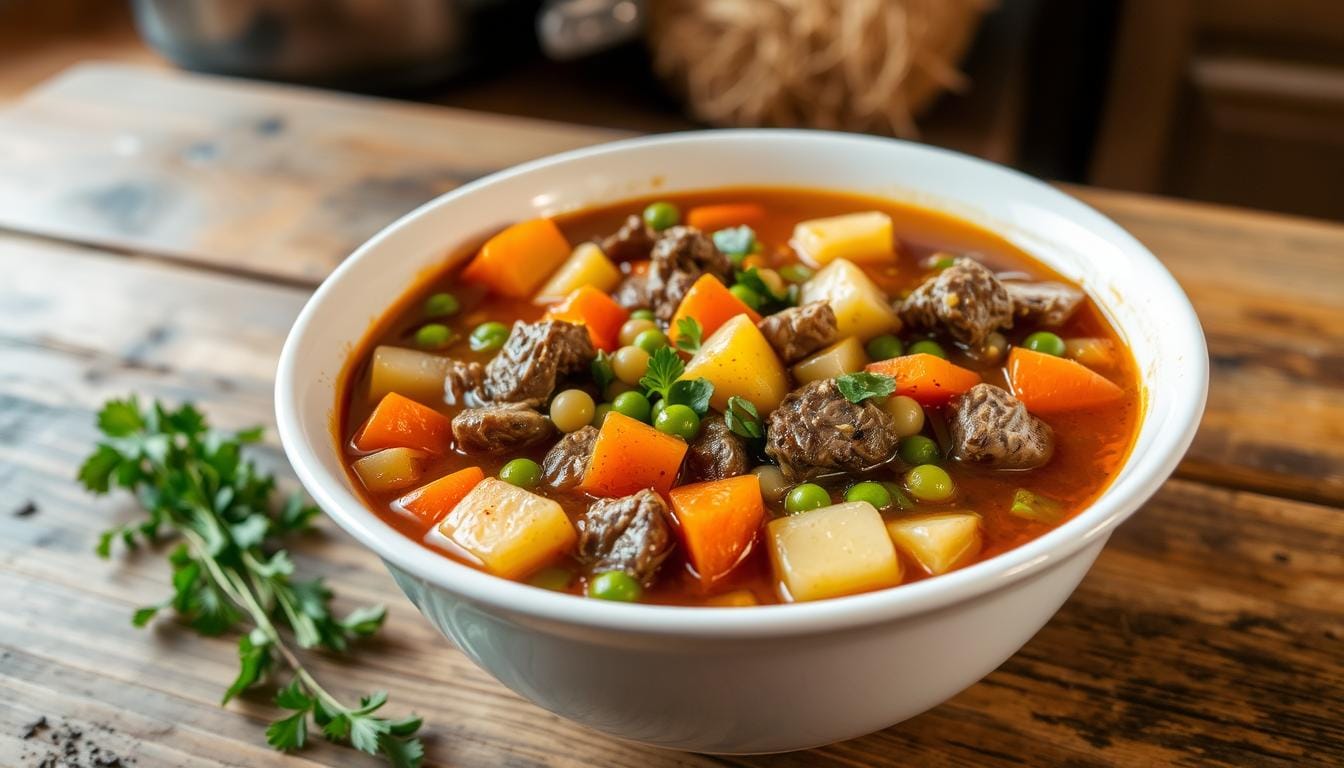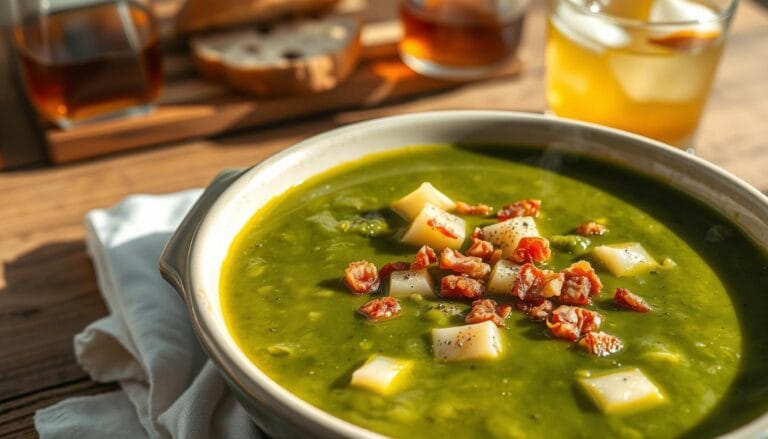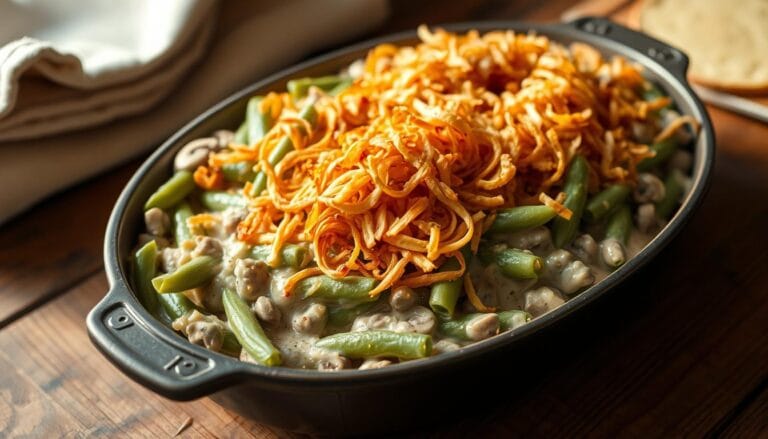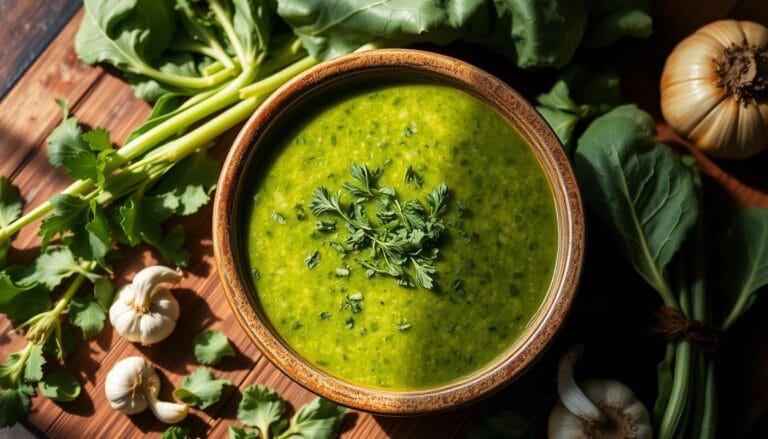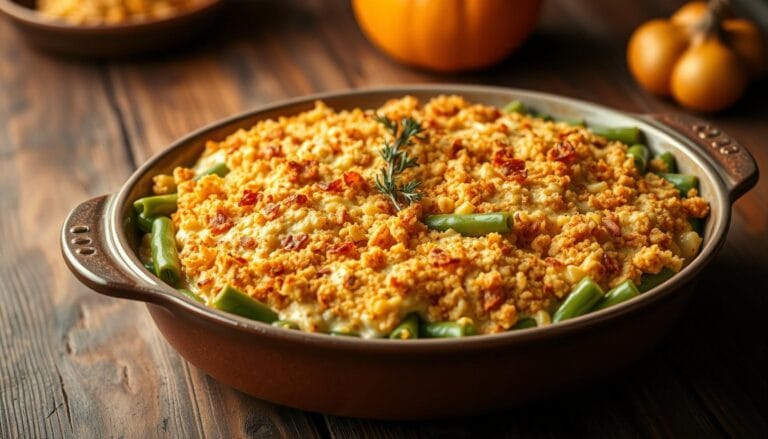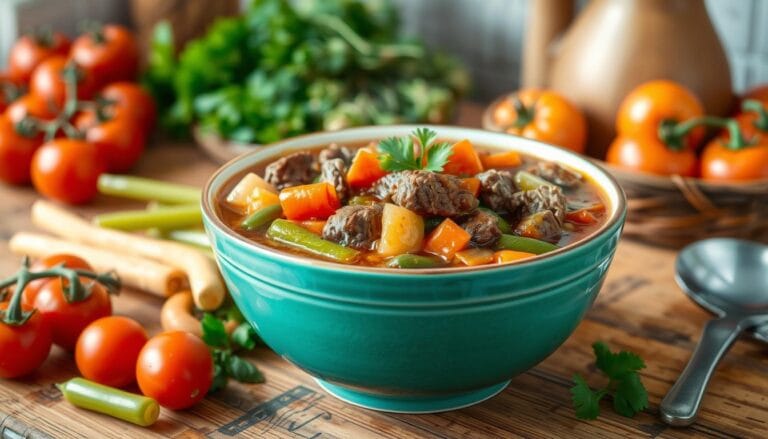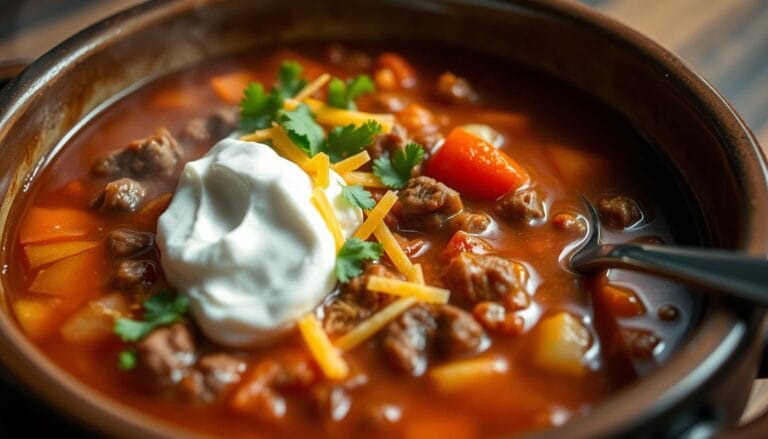Step-by-Step Guide to Cooking Vegetable Beef Soup
When winter winds blow, nothing warms us like homemade soup. The best vegetable beef soup is more than a meal. It’s a warm hug that connects us through its rich flavors.
I grew up watching my grandmother make magic in the kitchen. Her vegetable beef soup was a special dish. It had tender beef, colorful veggies, and a broth that told family stories.
This recipe is your chance to make those memories for yourself. It’s easy, whether you’re experienced or new to cooking. With a few simple ingredients and some patience, you’ll create a meal that’s unforgettable.
Let’s start this journey together. We’ll make the most comforting vegetable beef soup you’ve ever had. Your kitchen will soon be filled with warmth and delicious smells.
Table of Contents
Essential Ingredients for Classic Vegetable Beef Soup
Making a tasty vegetable beef soup begins with picking the right ingredients. It’s all about choosing quality items that blend well together. This makes your soup a hit.
Selecting the Perfect Beef Cut
For tender and tasty soup, pick 3 to 4 pounds of beef chuck roast or stew meat. These cuts get tender in 1.5 to 2 hours. They make your soup’s meat incredibly tender and flavorful.
Fresh Vegetables and Aromatics
Choosing the right vegetables is key for a rich soup. Aim for a mix of:
- Carrots: 2 parts
- Celery: 2 parts
- Onions: 1 part
Use fresh veggies for the best taste and health benefits. Choose crisp, bright produce without any damage.
Broth and Seasoning Components
Your soup’s base is quality broth and the right seasonings. Here’s what you need:
- 48 ounces low-sodium beef broth
- 2 tablespoons tomato paste
- 2 bay leaves
- Fresh thyme
- Salt and black pepper
“The secret to an exceptional soup lies in balancing flavors and using fresh, high-quality ingredients.”
By picking the right beef and veggies, and using great broth and seasonings, you’ll make a warm, nourishing meal. It will fill your heart and belly.
Best Vegetable Beef Soup Preparation Tips
Learning how to make soup can turn a simple meal into a work of art. Your journey to making vegetable beef soup starts with key cooking tips. These tips will make your soup taste better and feel more satisfying.
The secret to a great soup is in how you prepare the meat. Choose a good beef cut like chuck roast for its rich flavor. Here are some tips for browning your meat:
- Pat the beef dry before seasoning
- Use a heavy-bottomed, non-stick pan for even browning
- Cook meat in small batches to prevent steaming
- Season with ½ tsp kosher salt and ¼ tsp black pepper
Another important step is sautéing your vegetables. Cut them into small, even pieces so they cook evenly. Onions, carrots, and celery are the base of your soup’s flavor. Cook them in olive oil until they’re soft and smell great.
“The key to a great soup is layering flavors from the very first step of preparation.” – Professional Chef
Save time by preparing your ingredients ahead of time. Chop your veggies, brown the meat, and measure out your spices before you start cooking. This makes the whole process easier and less stressful.
Remember, making soup takes time. Let it simmer slowly for about 2 hours. This will help the flavors blend together, making your soup a hearty and comforting meal.
Marinating and Preparing the Meat
Preparing meat is key to a tasty vegetable beef soup. The right methods can turn a simple dish into a feast. Let’s explore how to prepare beef for a soup that’s out of this world.
Proper Meat Cutting Techniques
Uniform cuts are essential for even cooking and texture. Here’s how to cut beef for soup perfectly:
- Select a beef chuck roast (1½ pounds)
- Trim excess fat carefully
- Cut into ½-inch uniform cubes
- Use a sharp knife for clean cuts
Beef Marination Process
Marinating beef makes it tender and flavorful. Try this quick marination for amazing taste:
| Ingredient | Quantity | Purpose |
|---|---|---|
| Soy Sauce | 2 tablespoons | Enhance umami flavor |
| Rice Vinegar | 2 teaspoons | Tenderize meat |
| Sesame Oil | 1 teaspoon | Add depth of flavor |
Marinate the beef for 15-20 minutes at room temperature. This helps absorb flavors better.
Browning Methods
Browning meat is vital for rich flavors in your soup. Here are expert tips for browning:
- Pat meat dry with paper towels
- Season with salt and pepper
- Heat pan to medium-high
- Brown meat in small batches
- Cook 2 minutes per side
“The secret to great soup is in the browning – it creates a flavor foundation that can’t be replicated.” – Professional Chef
Mastering these techniques will make your vegetable beef soup flavorful and perfectly textured.
Creating the Perfect Soup Base
Making a flavorful broth is key to a great vegetable beef soup. Start with a top-notch beef broth as the base for rich flavors. Chefs say using 7 cups of beef broth is essential for a standout soup.
- Use Better than Bouillon beef base for intense flavor depth
- Add Worcestershire sauce for umami complexity
- Deglaze the pan to incorporate browned meat bits
- Simmer slowly to develop layered taste profiles
“A great soup base transforms ordinary ingredients into an extraordinary meal.” – Culinary Wisdom
Creating a flavorful broth takes patience and skill. Begin by browning your meat well. This creates delicious fond (caramelized bits stuck to the pan).
When you deglaze with beef broth, these flavors blend perfectly into your soup base.
Chefs suggest simmering at a low, steady heat. This way, flavors mix well, making a hearty broth. Your vegetable beef soup will be unforgettable.
Vegetable Preparation and Cooking Order
Learning how to prep and cook vegetables is key for a great vegetable beef soup. The right way to do it keeps each ingredient’s texture and flavor just right.
Proper Cutting Techniques
When you’re getting your veggies ready, make sure they’re all the same size. This helps them cook evenly. Cut them into about 1-inch pieces for:
- Carrots
- Potatoes
- Celery
- Green beans
Optimal Cooking Sequence
The order in which you cook your veggies is very important. Start with the harder ones that take longer to cook:
- Onions and garlic (4 minutes sautéing)
- Carrots and celery (about 4-5 minutes)
- Potatoes (add them halfway through cooking)
- Softer veggies like green beans (last 20 minutes)
Adding Vegetables at the Right Time
Adding veggies at the right time is crucial. Harder root vegetables go in first. Delicate ones like green beans cook faster.
“Timing is everything in soup making. Add your vegetables in stages to preserve their individual character and prevent mushy textures.”
By following these tips, you’ll make a soup with perfectly cooked, tasty veggies that go great with the beef.
Mastering the Simmering Process
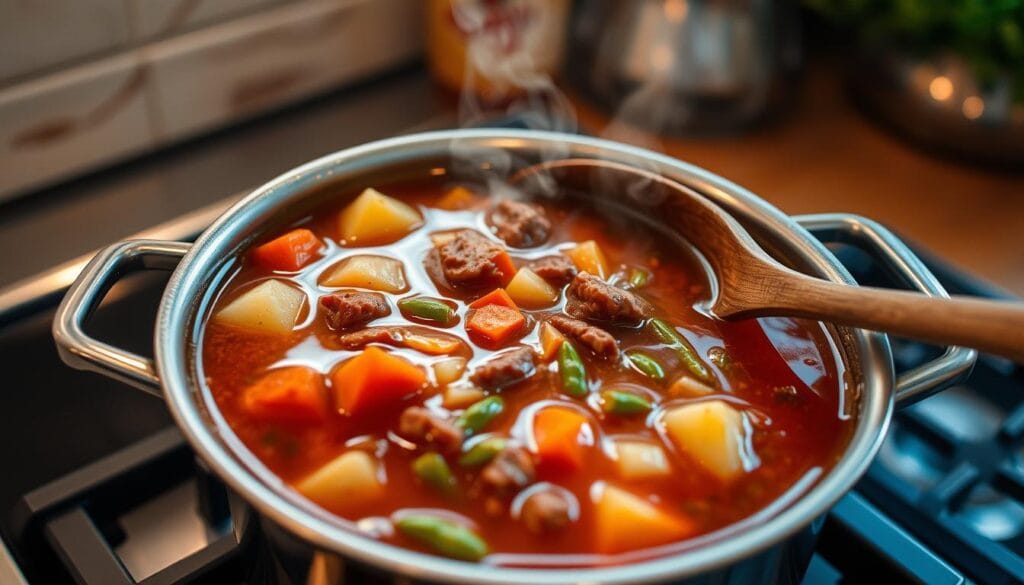
Simmering is key to making a great vegetable beef soup even better. It’s all about the right techniques to enhance flavor and texture.
For a soup that’s rich and tender, cook it for 1 to 2 hours. Chefs say to keep the heat low and steady. This lets the ingredients blend well without losing their texture.
“Perfect simmering is about patience and precise temperature control.” – Culinary Expert
Choosing the right simmering method depends on how you cook:
- Stovetop method: Simmer for 90 minutes
- Slow cooker method: Cook on low for 6-8 hours
Important simmering techniques include:
- Keeping the heat gentle, not boiling
- Stirring occasionally to avoid sticking
- Removing any foam that forms on top
| Cooking Method | Temperature | Cooking Time |
|---|---|---|
| Stovetop | Low-Medium Heat | 90 minutes |
| Slow Cooker | Low Setting | 6-8 hours |
Pro tip: The meat should be fork-tender and vegetables soft but not mushy when your simmering process is complete.
Enhancing Flavors with Herbs and Seasonings
Making a memorable vegetable beef soup is more than just using basic ingredients. The right mix of herbs and seasonings can turn a simple dish into a masterpiece. It’s all about layering and balancing flavors to create a rich, satisfying soup that will wow your loved ones.
Essential Herb Combinations for Depth of Flavor
Choosing the right herbs can take your vegetable beef soup from good to great. Chefs suggest using a mix of classic herbs that go well with beef and veggies:
- Thyme: Adds an earthy, minty taste
- Marjoram: Brings a sweet, delicate flavor
- Bay leaves: Offer a subtle, complex aroma
- Rosemary: Adds a strong, pine-like flavor
- Parsley: Finishes with a fresh, light taste
Strategic Seasoning Timeline
Getting the seasoning right is all about timing. Start with strong herbs like thyme and bay leaves early. They slowly release their flavors, enriching the soup. Save lighter herbs like parsley for the end to keep their freshness.
“Herbs are the magic wands of cooking, capable of transforming simple ingredients into extraordinary dishes.” – Culinary Wisdom
Remember, add salt and pepper little by little. Taste your soup often and adjust the seasoning as needed. A bit of Italian seasoning, about 1 teaspoon for the whole pot, can add a rich flavor.
Personal Flavor Experimentation
Feel free to try new herb combinations. Each soup can be a unique journey. Begin with classic mixes, then add new herbs to find your own special taste.
Storage and Reheating Guidelines
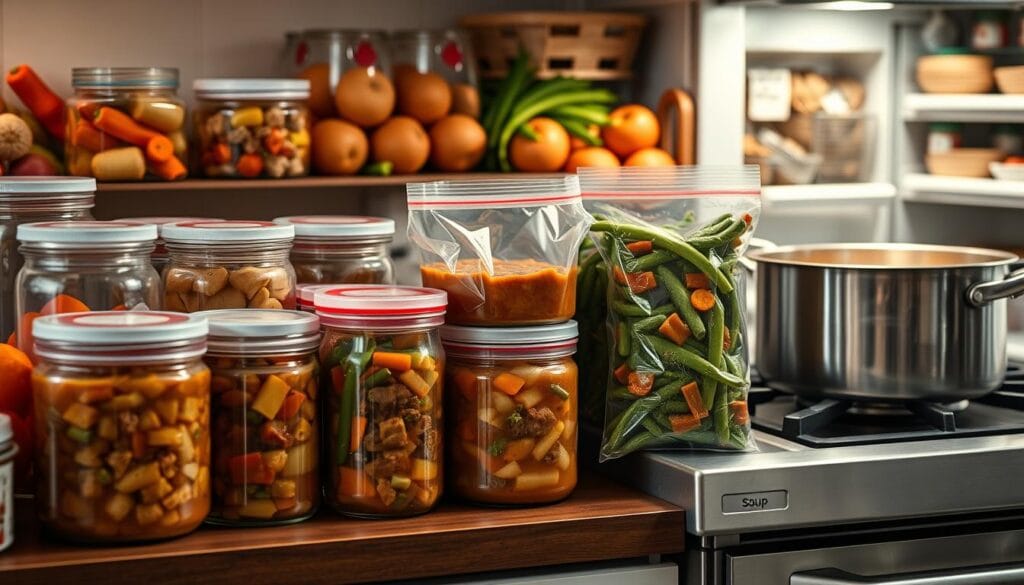
Storing your soup right is key to keeping its flavor and safety. After making your vegetable beef soup, you’ll want it to stay fresh and tasty for later.
Here are the main soup storage tips:
- Refrigerate leftover soup within 2 hours of cooking
- Store in airtight containers with tight-fitting lids
- Leave about 2 inches of space at the top for expansion when freezing
Reheating tips can greatly improve your soup’s quality. Cold soup straight from the fridge needs careful handling to keep its flavor and texture.
How long you can store your soup depends on the method:
| Storage Method | Maximum Duration |
|---|---|
| Refrigerator | 3-4 days |
| Freezer | 3 months |
For the best reheating results, follow these tips:
- Thaw frozen soup in the refrigerator overnight
- Reheat on stovetop over medium-low heat
- Stir occasionally to prevent scorching
- Add a splash of broth if the soup seems too thick
“Flavors often develop and improve after a day in the refrigerator, making your soup even more delicious!” – Culinary Experts
Pro tip: Always check the soup’s temperature before serving. Make sure it reaches 165°F for food safety during reheating.
Tips for Adjusting Consistency and Flavor
Getting your vegetable beef soup just right takes focus on soup consistency and flavor. Professional chefs know that the little details can make a big difference. They turn a good soup into a memorable dish.
Mastering Broth Thickness
There are several ways to adjust your soup’s texture:
- Add flour or cornstarch slurry to thicken broth
- Simmer uncovered to reduce liquid naturally
- Mash some potatoes directly into the soup for added density
- Use instant potato flakes as a quick thickening agent
Seasoning Balance Techniques
Adjusting flavors is an art that needs patience and precision. Here are some expert tips:
- Taste your soup repeatedly during cooking
- Add salt incrementally to prevent over-seasoning
- Use acid (like vinegar or lemon juice) to brighten flat flavors
- Incorporate fresh herbs near the end of cooking for maximum impact
“The difference between a good soup and a great soup is often just a pinch of seasoning.”
| Flavor Issue | Correction Method |
|---|---|
| Too Salty | Add potato chunks or dilute with unsalted broth |
| Bland Taste | Introduce fresh herbs, garlic, or a splash of acid |
| Too Thin | Use 4 tablespoons of flour for thickening |
| Lacks Depth | Add a small amount of tomato paste |
Remember, soup consistency and flavor are up to personal taste. Trust your taste buds and make small changes to get your soup just right.
Conclusion
Making the perfect homemade vegetable beef soup is an art. It needs patience, skill, and top-notch ingredients. This recipe shows that a great comfort food is more than just steps. It’s about passion and paying attention to every detail.
Preparing this soup takes 15-20 minutes to get ready and up to 3 hours to cook. It’s a labor of love. Each ingredient adds to the soup’s flavor. From the beef cubes to the frozen veggies, every step is crucial.
This soup feeds 6-8 people, perfect for family dinners or meal prep. It’s great for cold weather or when you just want a hearty meal. You can keep it in the fridge for 3 days or freeze it for 2-3 months. Serve it with saltine crackers and a sandwich for a complete meal.
Cooking is about trying new things and adding your own touch. Feel free to change the seasonings and ingredients to your liking. Your kitchen is your canvas, and this soup is your masterpiece.

